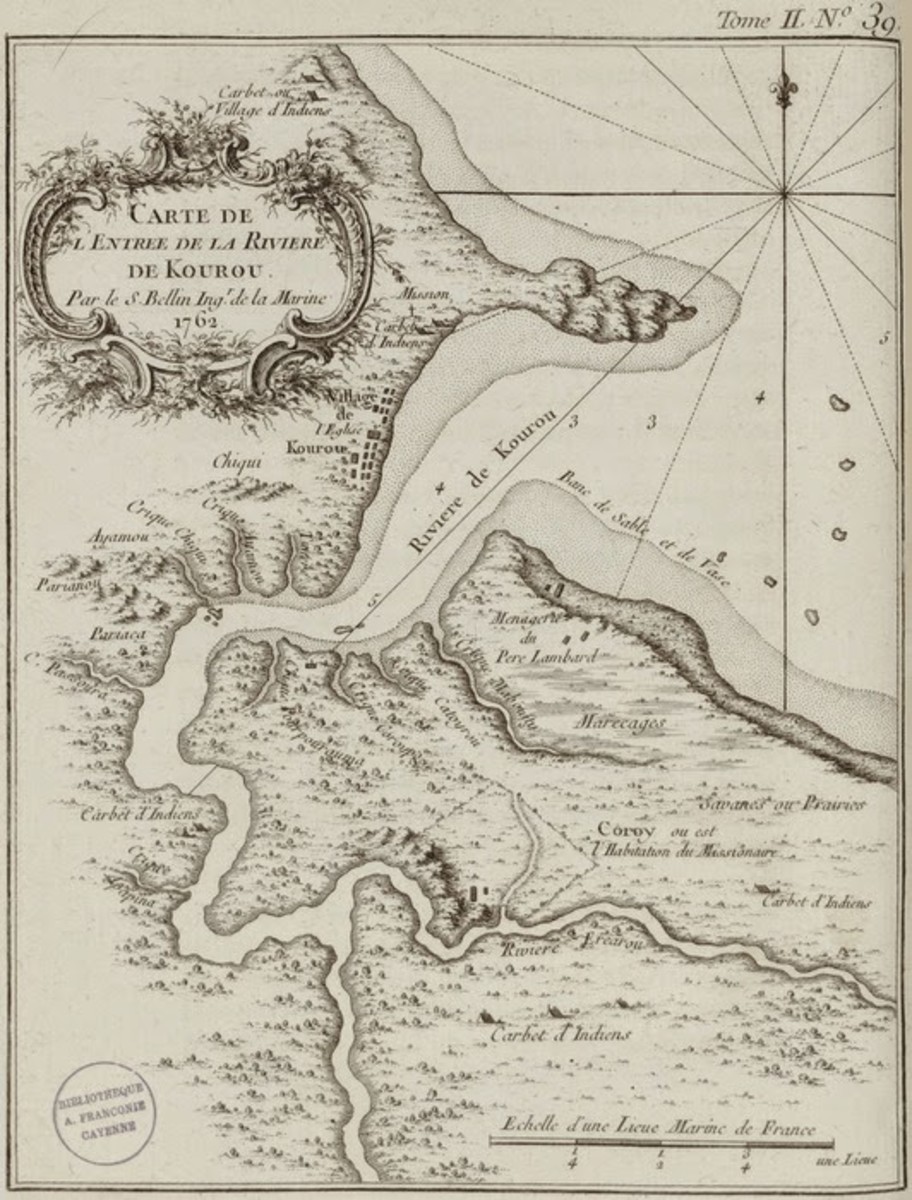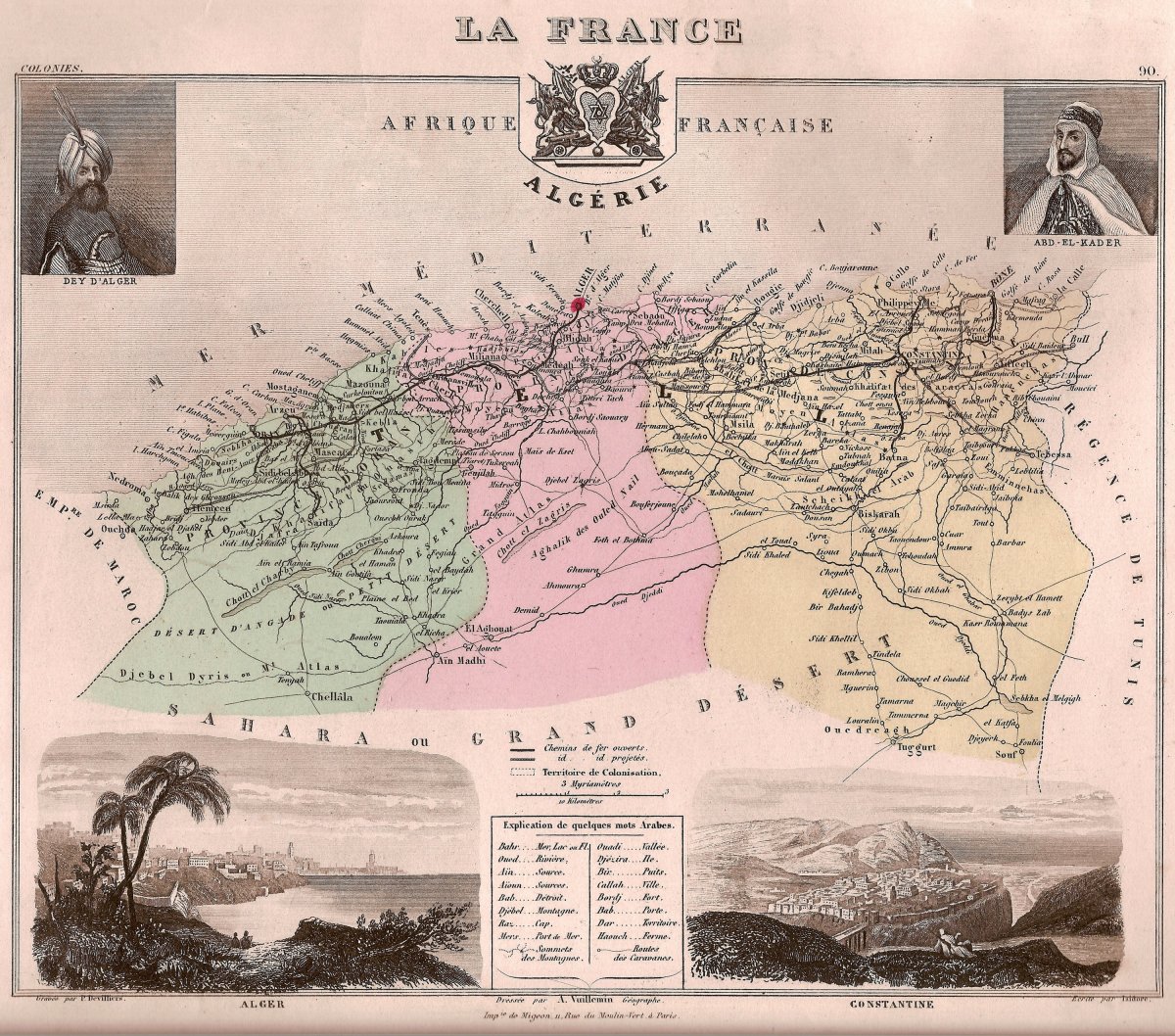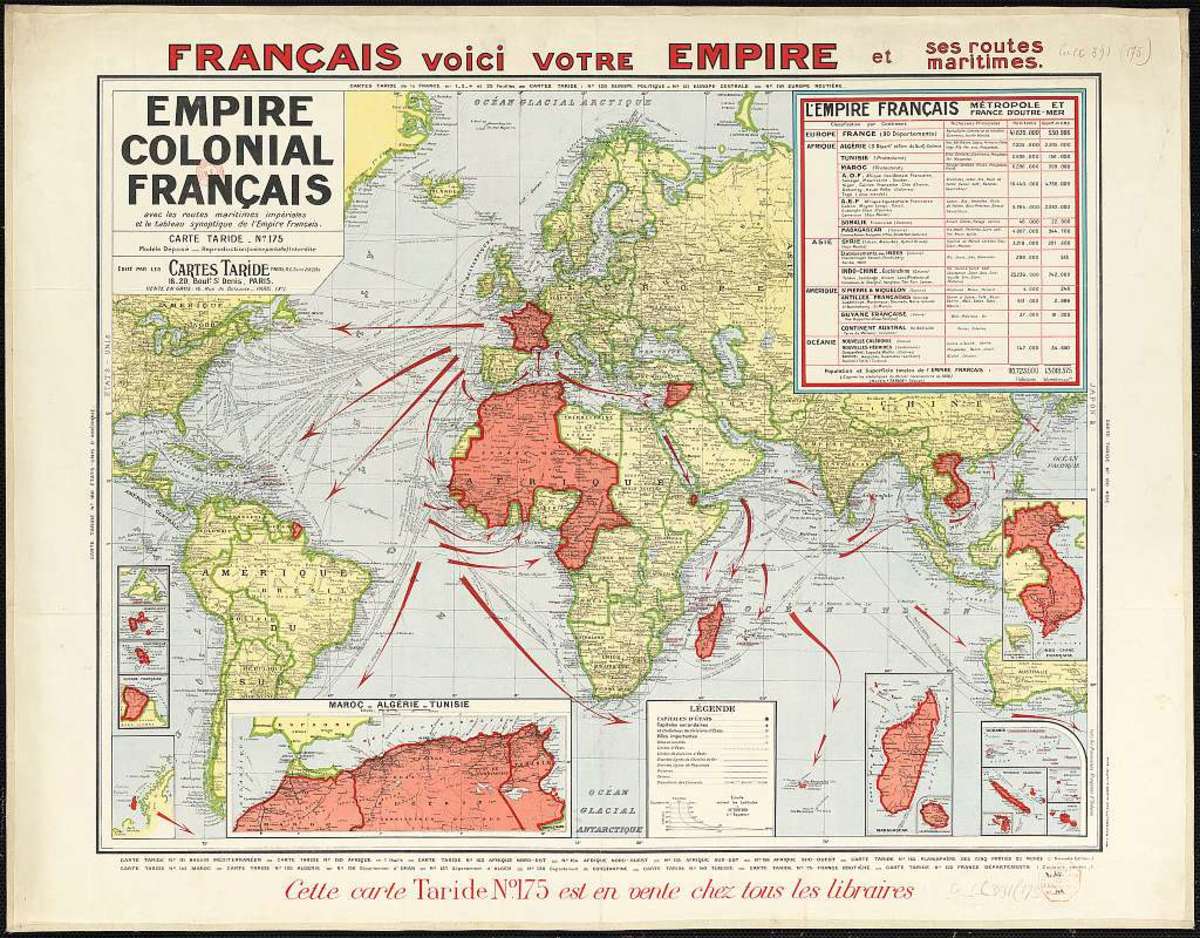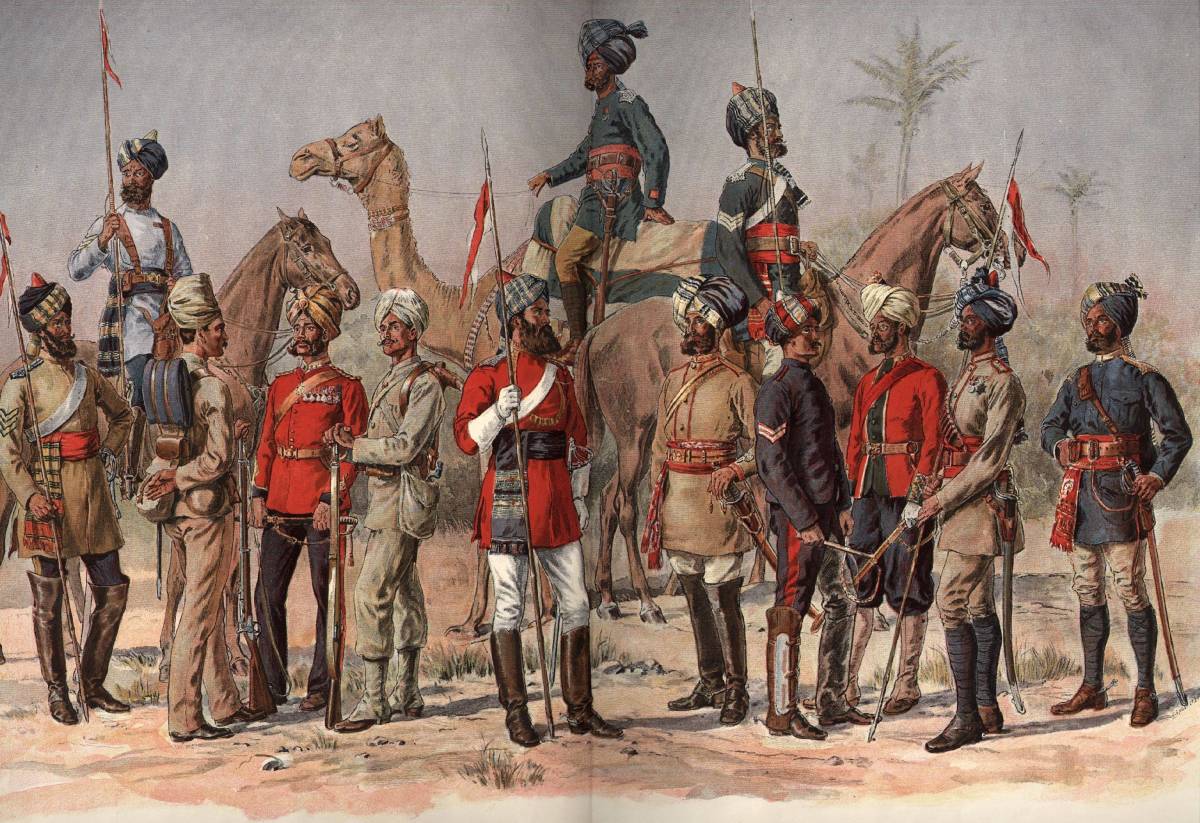Travails of the French Overseas Empire
Yale History Lecture on French Empire

French Colonialism: Progression Force or Disastrous venture?
The beginning of the 19th century opened a long and troublesome chapter in the history of Africa and Asia. The scramble for colonies by European countries left the world in disarray and confusion about the legacies of the colonial people’s past and the possibility of a bright future. France, a colonial power, planted her tricolor flag in Africa and Asia after much struggle at home and in the colonies. During the long period of colonization she underwent terrible turmoil at home and abroad that sorely tested her resolve to keep the colonies. Though she proclaimed it was for the benefit of the colonial population that she did and suffered much, the legacy of her work and suffering are not progressive as one would expect after listening to the ideal goals and ambitions of her empire builders and colonizers. Herbert Luethy, a noted historian present at the time the French overseas empire was collapsing details the ambitions of the France’s assimilationist policy and the problems France faced because of such ambitions. Herbert Luethy is correct in saying France herself was the cause of the downfall of the French Overseas Empire.
According to Herbert Luethy, France’s unique ambition for an overseas empire was to assimilate her colonies in to French culture and society; though he mentions her initial drive to colonize stemmed from the Church, mercantilism, finance and industrial capitalism to acquire raw materials, expand markets convert people to Catholicism. He explains France sought assimilation because her own history had been formed through the assimilation of various European communities. French civilization and their untold benefits such as freedom for women, technology and education were a byproduct of assimilation and dominance of French culture over mainland Europe. Luethy says the objective of French leaders was to get all the colonial population to dispose their own archaic cultures, embrace French culture and live for the glory, goodness and peace of France. However, during the 1950s, France began to doubt its assimilationist ideology. Hence, they were not confident of turning the colonial peoples into French people of different colors. Instead they feared the politically enfranchised people would seek their own nations’ good at France’s expense. As a result France ideologically lost the drive to keep her colonies and liquidated them in the 1960s.
France liquidated her colonies because she had no end of trouble at home and abroad. During period of conquest and colonization, Luethy explains France’s first main problem was there was no wide spread support within France for overseas colonization. Even the parliament was against colonialism. Only a few groups such as financiers and industrialists and the executive supported it. No widespread support spelled certain trouble in post 1789 France because the people would naturally go against what they saw as waste of time, money and sons. According to Luethy, the second problem France had was French leaders did not think whether the colonial expedition would be profitable for them. They defeated the foreign armies, but did not stay wholeheartedly to develop the conquered area. They spent plenty of money to conquer the area, but wouldn’t spare a penny to develop it industrially for their benefit. They did a half job of everything, neither staying wholly nor fully leaving. The third problem French colonizing effort faced was lack of concern for colonial efficiency. French leaders carelessly preached liberty, equality and fraternity to the colonial population. Instead of keeping the colonial population away from revolutionary thinking of 1789 and providing them with technical educations, the leaders went against the advice given by the empire builders and produced many intellectuals who took the 1789 French ideas and used it against France.
The fourth problem was France failed to develop a sustainable and profitable imperial economy. The colonies did not supplement France’s economy. Instead of providing raw materials to France, the colonies competed with France by offering the same products of wine and grain, which could had no market in Algeria and produced a slump in prices in France. According to Luethy, the fifth problem was the large number of French settlers in North Africa which numbered around 1 million at its height. France could not ignore these people, but neither could they ignore the other 8 million indigenous populations. These interests of these two populations always clashed with the former wanting absolute control over the latter to the point of compulsory labor. France see sawed between these two populations and their interests and could not find a point of reconciliation. Also because of the settler’s contempt for the locals, the local populations were never fully incorporated in to all aspects of French culture, justice, education. Luethy explains even though Algeria was a department in France, majority of the Algerians lived on the outskirts of French civilization. The sixth problem was the French leaders said something, but did something entirely different. They trumpeted enfranchisement for everyone across the empire, but refused to give people seats in the parliament. Luethy says the French colonial policy was not consistent. Their ideology and policy at home and abroad was not reliable and untrustworthy. Because of France’s notoriety for her revolutions and government upheavals, she undermined her own efforts to effectively control the colonies. According to Luethy, the seventh problem was France distrusted federalism, local autonomy and decentralization. They wanted everything to be centralized under a top down umbrella. The problem was the local groups to whom they preached rights and liberties, couldn’t in reality have any, because France wouldn’t give any local political autonomy. The eighth problem was World War 2 greatly incapacitated France economically, politically and militarily. Mounting external pressure from the USA and USSR, the non colonialist superpowers, discredited France. Also, the Japanese severely undermined French colonial presence in Indochina. Internal pressure from granting citizenship to colonial soldiers created a politicized class thirsty for change and rights. This including France’s devastation in the war greatly undermined France’s efforts to keep the colonies effectively as in the past. According to Luethy, the final and biggest problem France faced throughout her long troublesome period of colonization was Islam itself. Leuthy explains France could not effectively bring the local populations of her African empire to assimilate into France because of the Islam. He says Islam could not be compartmentalized as a religion. Its finality, totality and religious zeal devoured all aspects of life from politics to food and left no room for Europeanization. Thus the local population entrenched in Islam could not possibly be incorporated into France.

Comparing British and French Colonial Legacies
Upon careful examination of the problems France faced in her colonial adventures in North Africa and East Asia, I believe Luethy’s interpretation of French colonial legacy as a positive and progressive force is wrong for the following reasons. The first reason is the inherent foolishness of applying assimilation policy to the colonies. Assimilation worked for France in the previous millennium because they were all people of the same ethnicity and religion. How did France ever hope to assimilate 10s of millions of foreign people even assuming the people wanted to assimilate and France could given she actually did what she promised? France’s true intentions for colonial purposes were not assimilation but for her own good. The idea of assimilation is a contradiction to what actually could be done. How could Luethy and his predecessors think that the colonial populations would like to do away with their history and culture and adopt French culture? Don’t the colonial populations have their own histories, traditions, likes, dislikes, norms and taboos?
A good contrast between to the French colonial policy is the British colonial policy. The British never strove to make her colonial populations British in identity. They conquered and colonized and in the process established democratic institutions, civil establishments, respected the identity of her subjects. The practicality of the British policy is why majority of her former colonies are doing better in the world stage than former French colonies. The prime example is India, which currently has 28 official languages (the unofficial number is in the hundreds), has a larger population than Africa, has more religions than Africa and had 600 small kingdoms during British rule, which were all successfully unified in to one. India is an economic giant with a Westminster style government in place, no coup as of date, a civil service which effectively mans the whole country (a very useful institution implemented by the British instead of French military rule) and the largest railway system in the whole world. More successful than India are Malaysia, Singapore, South Africa and Hong Kong. While it is incorrect to say that British colonies did not have internal troubles and strife, they outperform most of the French Colonies in Africa and East Asia. Though the British never wanted assimilation and came to establish their commercial dominance, her post colonial legacy is far more practical, functional and out rightly better than French assimilation policy which was only in words, Balkanized Africa and leaving them with nothing other military dictators and brutal civil wars. The second reason is how can French colonialism ever be progressive when it so divisive at home and in the colonies? Mainland France itself had no stability in ideology and policy. Just as Luethy mentioned French leader switched from policy to policy never fully implementing anything except harsh, brutal and pompous military rule. The power struggle between the conservatives and liberals in France are indicative of this. French monarchs sided with the indigenous peoples, while the Republic supported the ruthless settler population. How can a mother country hope to support and create a stable government in the colonies when she herself is severely unstable? The third reason is a point Luethy himself mentioned.
Throughout their colonial period, the French said something and did something entirely different. They preached about civil rights, freedom and all the virtues of 1789, but they never thoroughly franchised the colonial population and implemented what they preached where it mattered—in parliament. Indeed, French progressivism was nothing but words from the perspective of the colonial population. Overall, Luethy’s interpretation that French colonialism as a progressive force is false, because the countries that emerged from her colonial period were left with nothing from their past or anything in the present. Neither were they French, nor were they anything else. Indeed France not only crippled her colonies but also brought untold pain and suffering to herself because of her unstable ideology and policy.
Source
Luethy, Herbert. France Against Herself:A Perceptive Study of France's past, Her Politics, and Her Unending Crises. New York: Frederick A. Praeger, Inc Publishers, 1955.









